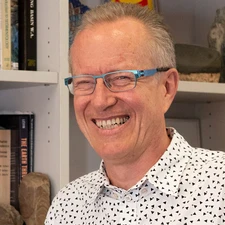R. Dietmar Müller

The 2021 Stephan Mueller Medal is awarded to R. Dietmar Müller for outstanding research in global plate tectonics, utilising open-source software and databases to advance understanding of changes in regional tectonics, sea level, topography, and atmospheric CO2.
Dietmar Müller is an outstanding scientist whose research has had an exceptional impact in the field of tectonics, with implications for advancing knowledge in the geosciences and beyond. His open research has fundamentally changed our understanding of the evolution of the Earth, influenced geoscience education, and continues to capture the imagination of the public. A key example is his construction of the first digital map of the age of the world’s ocean basins. This critical resource has formed the basis for hundreds of publications, with numerous discoveries that continue to transform our fundamental understanding of Earth’s evolution, environments, and geological resources. It is featured in an encyclopedia and four textbooks and is exhibited in museums in the US, Japan, and Austria.
Müller was one of the first to recognize that traditional geoscience, which is data rich and information poor, could exploit the enormous potential of open-source software and digital databases. His research group innovates tectonics by collaboratively developing an open-source virtual laboratory to ‘see’ deep into Earth in 3D space and back in time. Müller has been instrumental in developing the open-source plate reconstruction software GPlates (www.gplates.org). The complementary GPlates Portal, which allows online visualization of Earth’s tectonic evolution, is used in teaching and research and has received almost a million visits since 2014. Linking end-users across the world through an open-source model, GPlates software and associated open-access datasets have created a universal standard for 4D virtual Earth analysis, enabling novel interdisciplinary approaches to deep-time Earth system modelling.
Müller uses this 4D geodata synthesis approach in a tectonic framework to conduct outstanding research across many disciplines. Comparably to Stephan Mueller, Dietmar Müller has demonstrated his commitment to interdisciplinary research by his capacity to bring scientists to work together, initiating and promoting international collaboration. Examples include: the development of a long-term global sea level model, driving international collaborative efforts to unravel the history of continental landscapes and sedimentary basins, collaboratively using data mining to build the first digital map of the geology of the seafloor, and modelling how tectonic cycles drive the deep oceanic carbon cycle.
Müller is an exceptional mentor with excellent people skills. He has supervised 30 PhD candidates to completion and supported 22 postdoctoral fellows, the vast majority of which went on to pursue geoscience careers in industry, government, and academia.
In summary, Dietmar Müller is a creative and essential figure in global tectonics who has made fundamental contributions to geosciences and whose research will continue to have an impact in the future. He is a worthy recipient of the 2021 Stephan Mueller Medal.
Publication resulting from this medal
Müller, R. D., Flament, N., Cannon, J., Tetley, M. G., Williams, S. E., Cao, X., Bodur, Ö. F., Zahirovic, S., and Merdith, A.: A tectonic-rules-based mantle reference frame since 1 billion years ago – implications for supercontinent cycles and plate–mantle system evolution, Solid Earth, 13, 1127–1159, https://doi.org/10.5194/se-13-1127-2022, 2022.
